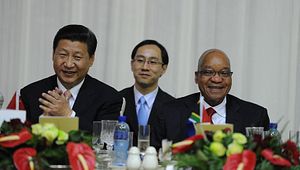Chinese Foreign Minister Wang Yi visited South Africa this week, where he met with President Jacob Zuma as well as International Relations and Cooperation Minister Maite Nkoana-Mashabane.
In their meeting, both Wang and Zuma stressed the importance of Chinese aid for South African development. Zuma said that South Africa appreciated China’s help in that regard while Wang said China remained committed to supporting industrialization and infrastructure building in South Africa as well as the entire African continent. Wang particularly noted South Africa’s public health sector as an area where China will seek to make contributions.
“China will continue to play a pivotal role in South Africa’s re-industrialization and developmental agenda going forward,” Nkoana-Mashabane told journalists in a press conference after her meeting with Wang.
South Africa, China’s largest trading partner in Africa, is one of only two African nations to join the Chinese-led Asian Infrastructure Investment Bank (AIIB) so far, with Egypt as the other. China and South Africa will also work together to establish the news BRICS bank, with South Africa to host the regional center for the development bank.
While South African clearly values its economic relationship with China, like many other nations, it is also concerned about a trade deficit with China. After her meeting with Wang, Nkoana-Mashabane told reporters, “Our two Governments are working very hard together to address the negative trade deficit and to ultimately attain a more equitable and mutual trade balance.”
China, for its part, sees South Africa as a crucial piece of its relationship with the entire African continent. “China-South Africa cooperation will drive China-Africa cooperation and promote an overall African revival,” Wang said during his meeting with Zuma.
But even as Wang and South African leaders extolled a cooperative relationship, acts of violence against foreigners in South Africa made life difficult for some Chinese citizens. The attacks, centered thus far in the coastal city of Durban, have left five dead and hundreds more homeless. Some 2,000 foreign nationals have sought shelter at refugee camps in Durban, according to the South African aid group Gift of the Givers.
On Thursday, thousands of South Africans joined in a march through Durban signaling solidarity with foreign nationals.
Zuma condemned the violence in a speech before the National Assembly, calling it “shocking and unacceptable.” “No amount of frustration or anger can ever justify the attacks on foreign nationals and the looting of their shops,” Zuma said. “We condemn the violence in the strongest possible terms.”
However, Zuma also recognized legitimate concerns among South Africans over “illegal and undocumented immigrants in the country, the increase in the number of shops or small businesses that have been taken over by foreign nationals and also perceptions that foreign nationals commit or perpetrate crime.”
Above all, the protesters are frustrated by a lack of economic opportunity, symbolized by high unemployment rates and rising inequality. “There are socio-economic issues that have been raised which are being attended to,” Zuma said.
Most of those targeted in the attacks were immigrants from other African countries, especially those who own and operate small businesses. However, Chinese shopkeepers were caught up in the violence as well.
Chinese Foreign Ministry spokesperson Hong Lei told reporters that some Chinese-owned shops had been looted. China’s embassy in South Africa “lodged representations with the local police, asking them to take prompt and effective measures to guarantee the personnel and property security of Chinese citizens,” Hong said. He added that the embassy has warned Chinese citizens “to step up security precautions.”
South Africa has a large Chinese immigrant population, with estimates ranging from 200,000 to over 300,000.

































